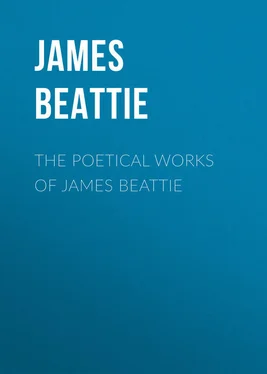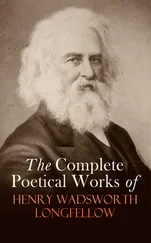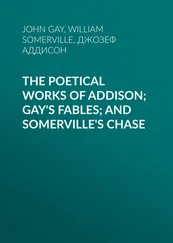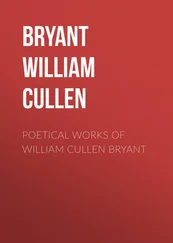James Beattie - The Poetical Works of James Beattie
Здесь есть возможность читать онлайн «James Beattie - The Poetical Works of James Beattie» — ознакомительный отрывок электронной книги совершенно бесплатно, а после прочтения отрывка купить полную версию. В некоторых случаях можно слушать аудио, скачать через торрент в формате fb2 и присутствует краткое содержание. ISBN: , Жанр: foreign_antique, foreign_prose, foreign_poetry, на английском языке. Описание произведения, (предисловие) а так же отзывы посетителей доступны на портале библиотеки ЛибКат.
- Название:The Poetical Works of James Beattie
- Автор:
- Жанр:
- Год:неизвестен
- ISBN:http://www.gutenberg.org/ebooks/41760
- Рейтинг книги:5 / 5. Голосов: 1
-
Избранное:Добавить в избранное
- Отзывы:
-
Ваша оценка:
- 100
- 1
- 2
- 3
- 4
- 5
The Poetical Works of James Beattie: краткое содержание, описание и аннотация
Предлагаем к чтению аннотацию, описание, краткое содержание или предисловие (зависит от того, что написал сам автор книги «The Poetical Works of James Beattie»). Если вы не нашли необходимую информацию о книге — напишите в комментариях, мы постараемся отыскать её.
The Poetical Works of James Beattie — читать онлайн ознакомительный отрывок
Ниже представлен текст книги, разбитый по страницам. Система сохранения места последней прочитанной страницы, позволяет с удобством читать онлайн бесплатно книгу «The Poetical Works of James Beattie», без необходимости каждый раз заново искать на чём Вы остановились. Поставьте закладку, и сможете в любой момент перейти на страницу, на которой закончили чтение.
Интервал:
Закладка:
Perhaps it was not printed till the beginning of the following year. In a letter to Beattie, dated Feb. 1st, 1779, Mrs. Montagu says, "I was much pleased with your pamphlet on Psalmody."
22
He was born in 1768, and was named after James Hay, Earl of Errol, our author's early patron.
23
Writing from Edinburgh, 28th May, 1784, to his niece, Miss Valentine (now Mrs. Glennie), Beattie describes the sensation caused in that city by the performances of Mrs. Siddons. He says that he met her at the house of Lord Buchan; that he played to her many Scotch airs on the violoncello, with which she was much gratified; and that "she sung 'Queen Mary's Complaint' to admiration, and I had the honour to accompany her on the bass." – Forbes's Life of Beattie , vol. ii. p. 324, octavo ed.
I am informed, by the incomparable actress in question, that the quotation just given contains an utter falsehood, which, when Forbes's Life of our author first appeared, in 1806, she read with astonishment. She remembers perfectly having been introduced to Beattie at Lord Buchan's, but she is quite certain she did not sing either Queen Mary's Complaint or any other song; and she observes, that if she had sung to his accompaniment, the circumstance would have been so striking that it could not possibly have escaped her recollection.
Qy. Has Beattie's letter been mutilated, the person who transcribed it for the press having by mistake omitted some lines? and do the words "she sung," in the concluding sentence, refer to some other more musical lady, and not to Mrs. Siddons?
24
He was so named after Mrs. Montagu. From one of Beattie's letters, dated 1789, it appears that she had made a handsome present of money to her godson.
25
I possess a copy of it which bears the following inscription:
On one of its fly-leaves the ever-ready pen of Hayley has written the subjoined sonnet:
"Bard of the North! I thank thee with my tears
For this fond work of thy paternal hand:
It bids the buried youth before me stand
In nature's softest light, which love endears.
Parents like thee, whose grief the world reveres,
Faithful to pure affection's proud command,
For a lost child have lasting honours plann'd,
To give in fame what fate denied in years.
The filial form of Icarus was wrought
By his afflicted sire, the sire of art!
And Tullia's fane engross'd her father's heart:
That fane rose only in perturbed thought;
But sweet perfection crowns, as truth begun,
This Christian image of thy happier son."
26
It was afterwards published for sale in 1799. I extract from it a jeu d'esprit – one of those pieces which Beattie printed, in opposition to the advice of Sir William Forbes and some other grave friends.
Father Hodge 96had his pipe and his dram,
And at night, his cloy'd thirst to awaken,
He was served with a rasher of ham,
Which procured him the surname of Bacon .
He has shown that, though logical science
And dry theory oft prove unhandy,
Honest Truth will ne'er set at defiance
Experiment, aided by brandy.
Des Cartes bore a musket, they tell us,
Ere he wished, or was able, to write,
And was noted among the brave fellows,
Who are bolder to tipple than fight.
Of his system the cause and design
We no more can be pos'd to explain: —
The materia subtilis was wine,
And the vortices whirl'd in his brain.
Old Hobbes, as his name plainly shows,
At a hob-nob was frequently tried:
That all virtue from selfishness rose
He believ'd, and all laughter from pride. 97
The truth of his creed he would brag on,
Smoke his pipe, murder Homer, 98and quaff,
Then staring, as drunk as a dragon,
In the pride of his heart he would laugh.
Sir Isaac discover'd, it seems,
The nature of colors and light,
In remarking the tremulous beams
That swom on his wandering sight.
Ever sapient, sober though seldom,
From experience attraction he found,
By observing, when no one upheld him,
That his wise head fell souse on the ground.
As to Berkley's philosophy – he has
Left his poor pupils nought to inherit,
But a swarm of deceitful ideas
Kept like other monsters, in spirit. 99
Tar-drinkers can't think what's the matter,
That their health does not mend, but decline:
Why, they take but some wine to their water,
He took but some water to wine.
One Mandeville once, or Man-devil,
(Either name you may give as you please)
By a brain ever brooding on evil,
Hatch'd a monster call'd Fable of Bees ,
Vice, said he, aggrandizes a people; 100
By this light let my conduct be view'd;
I swagger, swear, guzzle, and tipple:
And d – ye, 'tis all for your good.
David Hume ate a swinging great dinner,
And grew every day fatter and fatter;
And yet the huge hulk of a sinner
Said there was neither spirit nor matter.
Now there's no sober man in the nation,
Who such nonsense could write, speak, or think:
It follows, by fair demonstration,
That he philosophiz'd in his drink.
As a smuggler, even Priestley could sin;
Who, in hopes the poor gauger of frightening,
While he fill'd the case-bottles with gin,
Swore he fill'd them with thunder and lightning. 101
In his cups, (when Locke's laid on the shelf),
Could he speak, he would frankly confess t' ye,
That unable to manage himself,
He puts his whole trust in Necessity.
If the young in rash folly engage,
How closely continues the evil!
Old Franklin retains, as a sage,
The thirst he acquired when a devil. 102
That charging drives fire from a phial,
It was natural for him to think,
After finding, from many a trial,
That drought may be kindled by drink.
A certain high priest could explain, 103
How the soul is but nerve at the most;
And how Milton had glands in his brain,
That secreted the Paradise Lost.
And sure it is what they deserve,
Of such theories if I aver it,
They are not even dictates of nerve,
But mere muddy suggestions of claret.
Our Holland Philosophers say, Gin
Is the true philosophical drink,
As it made Doctor Hartley imagine
That to shake is the same as to think . 104
For, while drunkenness throbb'd in his brain,
The sturdy materialist chose (O fye!)
To believe its vibrations not pain,
But wisdom, and downright philosophy.
Ye sages, who shine in my verse,
On my labours with gratitude think,
Which condemn not the faults they rehearse,
But impute all your sin to your drink.
In drink, poets, philosophers, mob, err;
Then excuse if my satire e'er nips ye:
When I praise, think me prudent and sober,
If I blame, be assur'd I am tipsy.
27
"I have been assured by those who were intimately acquainted with both, that of the two brothers, Montagu was in many respects the superior."
Читать дальшеИнтервал:
Закладка:
Похожие книги на «The Poetical Works of James Beattie»
Представляем Вашему вниманию похожие книги на «The Poetical Works of James Beattie» списком для выбора. Мы отобрали схожую по названию и смыслу литературу в надежде предоставить читателям больше вариантов отыскать новые, интересные, ещё непрочитанные произведения.
Обсуждение, отзывы о книге «The Poetical Works of James Beattie» и просто собственные мнения читателей. Оставьте ваши комментарии, напишите, что Вы думаете о произведении, его смысле или главных героях. Укажите что конкретно понравилось, а что нет, и почему Вы так считаете.












